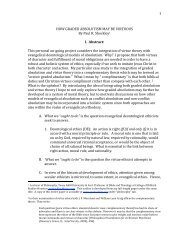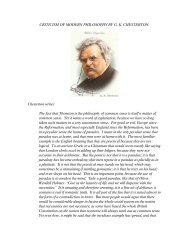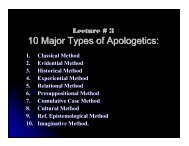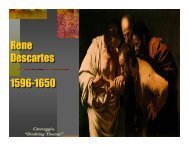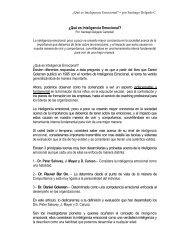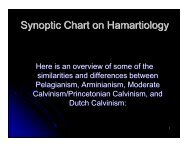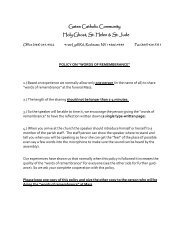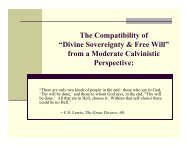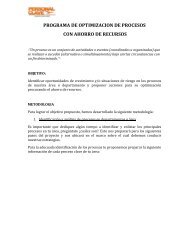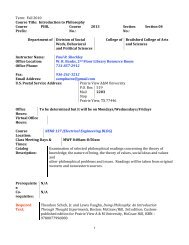Doctrine of Hamartiology: Consider the following passage: Consider ...
Doctrine of Hamartiology: Consider the following passage: Consider ...
Doctrine of Hamartiology: Consider the following passage: Consider ...
Create successful ePaper yourself
Turn your PDF publications into a flip-book with our unique Google optimized e-Paper software.
<strong>Consider</strong> <strong>the</strong> <strong>following</strong> <strong>passage</strong>:<br />
<strong>Doctrine</strong> <strong>of</strong> <strong>Hamartiology</strong>:<br />
Sin, Inheritance, and Imputation:<br />
www.prshockley.org<br />
Psalm 51:1-4<br />
“Have mercy on me, O God, according to your steadfast love;<br />
According to your abundant mercy blot out my transgressions.<br />
Wash me thoroughly from my iniquity,<br />
And cleanse me from my sin!<br />
For I know my transgressions, and my sin is ever before me.<br />
Against you, you only, have I sinned,<br />
And done that which is evil in your sight, so that you are justified<br />
in your sentence and blameless in your judgment.”<br />
Why study Sin? <strong>Consider</strong> <strong>the</strong><br />
<strong>following</strong>:<br />
• Our view <strong>of</strong> sin directly impacts our view <strong>of</strong> God and our<br />
view <strong>of</strong> God directly impacts our view <strong>of</strong> sin.<br />
• Our view <strong>of</strong> sin sheds light on our human condition:<br />
behavior, motives, relationships, and eternal destiny.<br />
• Our view <strong>of</strong> sin impacts our view <strong>of</strong> and need for salvation.<br />
• Our view <strong>of</strong> sin impacts our understanding <strong>of</strong> <strong>the</strong> church,<br />
spiritual life, spiritual warfare, and end times (restoration).<br />
Why study Sin? <strong>Consider</strong> <strong>the</strong><br />
<strong>following</strong>:<br />
• Our view <strong>of</strong> sin impacts our understanding <strong>of</strong><br />
biblical exegesis and <strong>the</strong>ological methodology.<br />
• Our view <strong>of</strong> sin sheds light on our human history.<br />
• Our view <strong>of</strong> sin impacts <strong>the</strong> way we do ministry.<br />
• Our view <strong>of</strong> sin sheds tremendous light upon Jesus<br />
Christ, His teachings, His Atonement, present<br />
ministry, future divine judgments, future reign,<br />
and eternal state.<br />
<strong>Consider</strong> <strong>the</strong> <strong>following</strong> quote:<br />
What is your definition <strong>of</strong> Sin?<br />
“Can an individual or society live without a<br />
complete disregard for a moral & spiritual<br />
center and not suffer from <strong>the</strong> wounds <strong>of</strong><br />
wickedness?”<br />
Please take a sheet <strong>of</strong> paper out and write out and<br />
comprehensively define what sin is.<br />
I will collect it in approx. 2-3 minutes.<br />
~ Ravi Zacharias.<br />
1
<strong>Consider</strong> Wayne Grudem’s Definition:<br />
“Sin is any failure to conform to <strong>the</strong> moral law <strong>of</strong> God in act,<br />
attitude, or nature” [Systematic Theology, 490].<br />
<strong>Consider</strong> Westminster Larger Catechism:<br />
Observations <strong>of</strong> this definition:<br />
1. Sin is defined in relation to God and His moral law (Rom.<br />
2:15 (conscience); Rom. 2:17-29 (written law).<br />
2. Sin includes our individual acts (1 John 3:4).<br />
3. Sin includes our attitudes that are contrary to what God<br />
requires <strong>of</strong> us (Gal. 5:20; Matt. 5:22; Mark 12:30).<br />
4. Sin is also defined in view <strong>of</strong> our very nature i.e., <strong>the</strong> internal<br />
character that is <strong>the</strong> essence <strong>of</strong> who we are as persons. As Paul<br />
states, “while we were yet sinners Christ died for us” (Rom. 5:8)<br />
or “we were by nature children <strong>of</strong> wrath, like <strong>the</strong> rest <strong>of</strong><br />
mankind” (Eph. 2:3).<br />
“Sin is any want <strong>of</strong> conformity unto, or<br />
transgression <strong>of</strong> any law <strong>of</strong> God, given as<br />
a rule to <strong>the</strong> reasonable creature.”<br />
<strong>Consider</strong> Millard Erickson’s<br />
Definition <strong>of</strong> Sin:<br />
“‘Sin is any lack <strong>of</strong> conformity, active or<br />
passive to <strong>the</strong> moral law <strong>of</strong> God. This<br />
may be a matter <strong>of</strong> act, <strong>of</strong> thought, or <strong>of</strong><br />
inner disposition or state.’ Sin is failure<br />
to live up to what God expects <strong>of</strong> us in<br />
act, thought, and being.”<br />
~ Systematic Theology, 578.<br />
A Comprehensive Definition <strong>of</strong> Sin should<br />
involve <strong>the</strong> <strong>following</strong> elements:<br />
Sin is transgressing <strong>the</strong> Law <strong>of</strong> God<br />
Sin is a failure to conform to <strong>the</strong> standard <strong>of</strong> God.<br />
Sin is a state within humanity.<br />
Sin is rebellion against God<br />
Sin is wrongful acts towards both God and Man.<br />
~ Moody Handbook <strong>of</strong> Theology by P. Enns<br />
Sin is a transgression <strong>of</strong> <strong>the</strong> law <strong>of</strong> God:<br />
Sin is a failure to conform to <strong>the</strong><br />
standard <strong>of</strong> God:<br />
The Greek word parabasis means<br />
overstepping, transgression. God gave <strong>the</strong><br />
Mosaic law to heighten man’s understanding<br />
<strong>of</strong> His standard and <strong>the</strong> seriousness <strong>of</strong><br />
transgressing that standard ( Rom. 4:15 ).<br />
Thereafter, when God said, “You shall not<br />
bear false witness,” a lie was seen to be what it<br />
is: an overstepping or transgression <strong>of</strong> <strong>the</strong> law<br />
<strong>of</strong> God (cf. Rom. 2:23 ; 5:14 ; Gal. 3:19 ).<br />
The Greek word hamartia means “miss <strong>the</strong> mark,”<br />
“every departure from <strong>the</strong> way <strong>of</strong> righteousness.”<br />
Thus, it means that all people have missed <strong>the</strong> mark<br />
<strong>of</strong> God’s standard and continue to fall short <strong>of</strong> that<br />
standard ( Rom. 3:23 ). This involves both sins <strong>of</strong><br />
commission as well as omission. Failure to do what is<br />
right is also sin ( Rom. 14:23 ).<br />
2
Sin is a state within man:<br />
Sin is rebellion against God.<br />
Sin is not only an act but also a principle that<br />
dwells in man. Paul refers to <strong>the</strong> struggle with<br />
<strong>the</strong> sin principle within ( Rom. 7:14 , 17–25 ); all<br />
people have this sin nature<br />
( Gal. 3:22 ). Hebrews 3:13 refers to it “as <strong>the</strong><br />
power that deceives men and leads <strong>the</strong>m to<br />
destruction.” Jesus also refers to sin as a<br />
“condition or characteristic quality” (John 9:41;<br />
15:24 ; 19:11)<br />
Sin is rebellion against God. Ano<strong>the</strong>r Greek<br />
word for sin is anomia , which means<br />
“lawlessness” ( 1 John 3:4 ) and can be described<br />
as a “frame <strong>of</strong> mind.” It denotes lawless deeds<br />
( Titus 2:14 ) and is a sign <strong>of</strong> <strong>the</strong> last days,<br />
meaning “without law or restraint” ( Matt.<br />
24:12).<br />
Sin is wrongful acts towards God and<br />
man:<br />
A Definition <strong>of</strong> Sin:<br />
Sin is wrongful acts toward God and man.<br />
Romans 1:18 refers to “ungodliness and<br />
unrighteousness <strong>of</strong> men.” Ungodliness refers<br />
to man’s failure to obey God and keep <strong>the</strong><br />
commandments related to Him ( Exod. 20:1–<br />
11 ); unrighteousness is seen in man’s failure<br />
to live righteously toward his fellow man<br />
( Exod. 20:12–17 ).<br />
Therefore, sin is transgressing <strong>the</strong> Law <strong>of</strong><br />
God; a failure to conform <strong>the</strong> standard <strong>of</strong><br />
God; a state within humanity; rebellion<br />
against God; wrongful acts towards both<br />
God and Man.<br />
What is “Original Sin”, “Inherited Sin”, or<br />
“Inherited Corruption”?<br />
• Original sin may be defined as <strong>the</strong> sinful state and condition in<br />
which every person is born. It is so designated because:<br />
1. It is derived from <strong>the</strong> original root <strong>of</strong> <strong>the</strong> human race (Adam),<br />
2. It is present in <strong>the</strong> life <strong>of</strong> every individual from <strong>the</strong> time <strong>of</strong> his<br />
birth, and<br />
3.It is <strong>the</strong> inward root <strong>of</strong> all <strong>the</strong> actual sins that defile <strong>the</strong> life <strong>of</strong><br />
man.<br />
Original sin refers to <strong>the</strong> corruption <strong>of</strong> our whole nature.<br />
Result <strong>of</strong> Original Sin is Total Depravity:<br />
<strong>Consider</strong> Charles C. Ryrie’s Definition:<br />
“Total depravity does not mean that everyone is as<br />
thoroughly depraved in his actions as he could<br />
possibly be, nor that everyone will indulge in every<br />
form <strong>of</strong> sin, nor that a person cannot appreciate and<br />
even do acts <strong>of</strong> goodness; but it does mean that <strong>the</strong><br />
corruption <strong>of</strong> sin extends to all men and to all parts <strong>of</strong><br />
all men so that <strong>the</strong>re is nothing within <strong>the</strong> natural man<br />
that can give him merit in God’s sight “ [Survey <strong>of</strong><br />
Bible <strong>Doctrine</strong>, 111].<br />
3
Result <strong>of</strong> Original Sin is Total Depravity:<br />
Humanity has an innate sin nature. Like Ryrie states,<br />
“The sin nature is <strong>the</strong> capacity to do all those things<br />
(good or bad) that can in no way commend us to God<br />
[Idem].” In fact, every aspect <strong>of</strong> <strong>the</strong> human person is<br />
involved:<br />
a. intellect (2 Cor. 4:4);<br />
b.conscience (1 Tim. 4:2);<br />
c. will (Rom. 1:28);<br />
d.heart (Eph. 4:18);<br />
e. and <strong>the</strong> total being (Rom. 1:18–3:20).<br />
How did Original Sin Impact <strong>the</strong> Image <strong>of</strong><br />
God in Man:<br />
Two views among Calvinists on how sin impacts <strong>the</strong> image <strong>of</strong><br />
God in man:<br />
1. Dutch Tradition: Image <strong>of</strong> God in Man is erased: Ephesians<br />
2:1;<br />
2. Princetonian Tradition: Image <strong>of</strong> God in Man is<br />
totally effaced (but not erased):<br />
a. Adam & Eve saw God and fled;<br />
b. Natural man clearly perceives; He is without excuse (Rom.<br />
1);<br />
c. Cornelius’ prayer went up to God as memorial (Acts 10);<br />
Subsequent conversion (Acts 11).<br />
What is Imputation:<br />
Definition: The word imputation comes from <strong>the</strong> Latin<br />
word imputare, meaning “to reckon,” “to charge to<br />
one’s account.”<br />
Imputation is interrelated to <strong>the</strong> problem <strong>of</strong> how sin is<br />
charged to every person.<br />
The biblical basis for imputation is Romans 5:12. This<br />
<strong>passage</strong> explains that sin entered <strong>the</strong> world through<br />
Adam. The interpretation <strong>of</strong> that verse determines one’s<br />
view <strong>of</strong> imputation.<br />
What is Imputation:<br />
Lewis S. Chafer writes, “The <strong>the</strong>ological meaning <strong>of</strong> <strong>the</strong> word<br />
impute is “to attribute or reckon over something to a person.”<br />
He later rights that <strong>the</strong> “scope <strong>of</strong> <strong>the</strong> doctrine <strong>of</strong> imputation<br />
controversy centers upon <strong>the</strong> one most <strong>the</strong>ological context in <strong>the</strong><br />
Bible-Romans 5:12-21. The context is, in <strong>the</strong> main, an<br />
elucidation <strong>of</strong> <strong>the</strong> primary declaration set forth in verse 12. It<br />
<strong>the</strong>refore follows that any interpretation <strong>of</strong> verse 12 which is not<br />
harmoniously unfolded in verses 13 to 21 is proved by so much<br />
to be wrong. The worthy student <strong>of</strong> <strong>the</strong>ology will spend much<br />
time on this portion <strong>of</strong> <strong>the</strong> Scriptures. It will not do to accept<br />
merely <strong>the</strong> findings <strong>of</strong> <strong>the</strong> best <strong>of</strong> men, but painstaking exegetical<br />
effort must be bestowed.” Systematic Theology, 2: 296-7.<br />
What is Imputation:<br />
Stearns, in his Present Day Theology (p. 321), suggests:<br />
“If you wish to know whe<strong>the</strong>r a man is a <strong>the</strong>ologian,<br />
turn to his Greek Testament, and if it opens <strong>of</strong> its own<br />
accord to <strong>the</strong> fifth chapter <strong>of</strong> Romans, and you find <strong>the</strong><br />
page worn and brown, you may safely set him down as<br />
a devotee <strong>of</strong> <strong>the</strong> sacred science” (cited by W.H. Griffith<br />
Thomas in Principles <strong>of</strong> Theology, pg. 163).<br />
Four Views <strong>of</strong> Imputation:<br />
Historically, <strong>the</strong>re have been four major views <strong>of</strong><br />
how sin is imputed to <strong>the</strong> human race:<br />
1. Pelagian View;<br />
2. Arminian View;<br />
3. Federal View;<br />
4. Augustinian or Seminal View.<br />
4
Pelagianism:<br />
Pelagius (c. 354- c. 420/440) was<br />
a brilliant thinker, ascetic (denied<br />
worldly pleasures) reformer and<br />
powerful speaker. He denied<br />
original sin from Adam and was<br />
declared a heretic by <strong>the</strong> Roman<br />
Catholic Church. Well educated<br />
in both Greek and Latin, he spent<br />
much <strong>of</strong> his time focusing on<br />
practical asceticism.<br />
Pelagianism:<br />
• St. Augustine, shocked that Pelagius and Celestius were not judged to be<br />
heretics, called <strong>the</strong> Council <strong>of</strong> Carthage in 418 and clearly stated nine beliefs<br />
<strong>of</strong> <strong>the</strong> Church that Pelagianism denied:<br />
1. Denied that death came from sin, not man's physical nature.<br />
2. Denied that Infants must be baptized to be cleansed from original sin.<br />
3. Denied that justifying grace covers past sins and helps avoid future sins.<br />
4. Denied that <strong>the</strong> grace <strong>of</strong> Christ imparts strength and will to act out God's<br />
commandments.<br />
Pelagianism:<br />
5. Denied that good works can come without God's grace.<br />
6. Denied that we confess we are sinners because it is true.<br />
7. Denied that saints should ask for forgiveness for <strong>the</strong>ir own sins.<br />
8. Denied that <strong>the</strong> saints also confess to be sinners because <strong>the</strong>y are.<br />
9. Denied that children dying without baptism are excluded from both <strong>the</strong><br />
Kingdom <strong>of</strong> heaven and eternal life.<br />
The last canon is no longer widely accepted, for example current Roman<br />
Catholic Church doctrine states that children who die without baptism are<br />
entrusted to <strong>the</strong> mercy <strong>of</strong> God (thus leaving unbaptized infants' salvation still<br />
in question). Of course <strong>the</strong> issue <strong>of</strong> infant salvation is debated among<br />
Protestants as well.<br />
Pelagianism:<br />
Pelagius taught that God created every soul directly (he<br />
despised <strong>the</strong> traducian <strong>the</strong>ory), and that every soul<br />
<strong>the</strong>refore was innocent and unstained.<br />
No created soul had any direct relation to <strong>the</strong> sin <strong>of</strong><br />
Adam; <strong>the</strong> only significance <strong>of</strong> Adam’s sin upon<br />
humanity was <strong>the</strong> bad example.<br />
Pelagianism:<br />
Pelagius, <strong>the</strong>refore, did not view Romans 5:12 as<br />
affecting all humanity; it did not.<br />
No sin <strong>of</strong> Adam was imputed to <strong>the</strong> human race; only<br />
those acts <strong>of</strong> sin that people <strong>the</strong>mselves committed were<br />
imputed to <strong>the</strong>m.<br />
Moreover, man did not die because he sinned but<br />
because <strong>of</strong> <strong>the</strong> law <strong>of</strong> nature. Adam would have died<br />
even if he had not sinned. Pelagius and his doctrines<br />
were condemned at <strong>the</strong> Council <strong>of</strong> Carthage in A.D.<br />
418.<br />
Summary <strong>of</strong> Pelagian View:<br />
1.View <strong>of</strong> Romans 5:12 is that people incur death when<br />
<strong>the</strong>y sin after Adam’s example.<br />
2.Original Sin affected Adam alone.<br />
3.No one affected by Adam’s sin<br />
4.Belief prevalent among Unitarians<br />
5
Arminian View:<br />
Arminian View:<br />
Jacobus Arminius (1560–1609)<br />
was a Dutch <strong>the</strong>ologian. The<br />
Arminian view is <strong>the</strong><br />
representative in <strong>the</strong> Methodist<br />
church, Wesleyans,<br />
Pentecostals, and o<strong>the</strong>rs. In<br />
thought similar to Pelagianism,<br />
Arminius taught that man was<br />
not considered guilty because<br />
<strong>of</strong> Adam’s sin. When people<br />
would voluntarily and<br />
purposefully choose to sin even<br />
though <strong>the</strong>y had power to live<br />
righteously—<strong>the</strong>n, and only<br />
<strong>the</strong>n, would God impute sin to<br />
<strong>the</strong>m and count <strong>the</strong>m guilty.<br />
Although man does not possess original<br />
righteousness because <strong>of</strong> Adam’s sin, Augustus<br />
Strong writes:<br />
“God bestows upon each individual from <strong>the</strong> first<br />
dawn <strong>of</strong> consciousness a special influence <strong>of</strong> <strong>the</strong><br />
Holy Spirit, which is sufficient to counteract <strong>the</strong><br />
effect <strong>of</strong> <strong>the</strong> inherited depravity and to make<br />
obedience possible, provided <strong>the</strong> human will<br />
cooperates, which it still has power to do”<br />
[Systematic Theology, 601].<br />
Arminian View:<br />
Summary <strong>of</strong> Arminian View:<br />
Thus Arminius recognized an effect from Adam’s sin<br />
but not in <strong>the</strong> sense <strong>of</strong> total depravity; through divine<br />
enablement man could still make righteous choices.<br />
Romans 5:12 is not understood as all humanity<br />
suffering <strong>the</strong> effect <strong>of</strong> Adam’s sin and death; but<br />
ra<strong>the</strong>r because <strong>of</strong> <strong>the</strong> individual agreement with<br />
Adam’s act is sin imputed to <strong>the</strong> individual.<br />
1. View <strong>of</strong> Romans 5:12 is that all people consent to Adam’s<br />
sin—<strong>the</strong>n sin is imputed. Adam sinned and partially affected<br />
humanity.<br />
2. Depravity is not total; people received corrupt nature from<br />
Adam but not guilt or culpability.<br />
3. Methodists, Wesleyans, and various Pentecostals Holiness<br />
groups have historically embraced this view.<br />
Federal View:<br />
The federal view was<br />
originally propounded by<br />
Cocceius (1603–1669) and<br />
became a standard <strong>of</strong> belief<br />
in Reformed <strong>the</strong>ology. It was<br />
taught by men like Charles<br />
Hodge; J. Oliver Buswell, Jr.;<br />
and Louis Berkh<strong>of</strong>. This<br />
view is called <strong>the</strong> federal<br />
view because Adam is seen<br />
as <strong>the</strong> federal head or<br />
representative <strong>of</strong> <strong>the</strong> entire<br />
human race.<br />
Federal View:<br />
God entered into a covenant <strong>of</strong> works with Adam<br />
whereby He promised to bless Adam and <strong>the</strong>reby<br />
<strong>the</strong> entire human race with eternal life if Adam<br />
obeyed. Disobedience would bring suffering to<br />
<strong>the</strong> entire human race. As a result <strong>of</strong> Adam’s sin,<br />
since he was <strong>the</strong> representative <strong>of</strong> <strong>the</strong> human<br />
race, his sin plunged <strong>the</strong> entire human race into<br />
suffering and death.<br />
Through <strong>the</strong> one sin <strong>of</strong> Adam, sin and death are<br />
imputed to all humanity because all humanity<br />
was represented in Adam.<br />
6
Federal View:<br />
Charles Hodge defines <strong>the</strong> view: “in virtue <strong>of</strong> <strong>the</strong> union, federal<br />
and natural, between Adam and his posterity, his sin, although<br />
not <strong>the</strong>ir act, is so imputed to <strong>the</strong>m that it is <strong>the</strong> judicial ground <strong>of</strong><br />
<strong>the</strong> penalty threatened against him coming also upon <strong>the</strong>m<br />
[Charles Hodge, Systematic Theology, 2: 192-93].”<br />
Covenant <strong>of</strong> works: God entered into a covenant with Adam as<br />
<strong>the</strong> federal head (representative) <strong>of</strong> <strong>the</strong> human race in which God<br />
promised to bless Adam with eternal life if he would obey; if he<br />
disobeyed God, Adam would be judged with death.<br />
Summary <strong>of</strong> Federal View:<br />
Summary <strong>of</strong> Federal View:<br />
1. View <strong>of</strong> Romans 5:12 is that sin was imputed to humanity<br />
because <strong>of</strong> Adam’s sin.<br />
2. Adam alone sinned but human race affected depravity is total;<br />
3. Sin and guilt are imputed to everyone.<br />
4. Presbyterians, esp, those holding to Covenant Theology, and<br />
o<strong>the</strong>r Calvinistic evangelicals impacted by <strong>the</strong> writings <strong>of</strong> Charles<br />
Hodge.<br />
Augustinian or Seminal View <strong>of</strong> Sin:<br />
This view is named after<br />
Augustine ( a.d. 354–430)<br />
and has been more recently<br />
held by Calvin, Lu<strong>the</strong>r,<br />
Shedd, and Strong. This<br />
view teaches that <strong>the</strong><br />
statement “all sinned” in<br />
Romans 5:12 suggests that<br />
all humanity was a<br />
participant in Adam’s sin.<br />
Augustinian or Seminal View <strong>of</strong> Sin:<br />
Just as Levi (although not yet born) paid ti<strong>the</strong>s to<br />
Melchizedek through Abraham in that Levi was<br />
“seminally present” in Abraham ( Heb. 7:9–10 ),<br />
in a similar way, all humanity was “seminally<br />
present” in Adam when Adam sinned and<br />
<strong>the</strong>refore all humanity participated in <strong>the</strong> sin.<br />
Therefore, <strong>the</strong> sin <strong>of</strong> Adam and <strong>the</strong> resultant<br />
death is charged to all humanity because all<br />
humanity is guilty. God holds all humanity guilty<br />
because all humanity is guilty.<br />
Augustinian or Seminal View <strong>of</strong> Sin:<br />
The Augustinian view is that <strong>the</strong> sinfulness <strong>of</strong><br />
humanity is transmitted ra<strong>the</strong>r than imputed, i.e.,<br />
“charged.”<br />
Remember <strong>the</strong> word “impute” means to<br />
“attribute something to a person that usually is<br />
derived from ano<strong>the</strong>r.”<br />
Summary <strong>of</strong> Seminal View:<br />
1. View <strong>of</strong> Romans 5:12: Sin is imputed to<br />
humanity because <strong>of</strong> Adam’s sin.<br />
2. Humanity sinned in Adam; Depravity is total;<br />
3. Sin and guilt are imputed.<br />
4. Reformers; Calvinistic evangelicals.<br />
7
1. Adam would have died<br />
whe<strong>the</strong>r sinned or not.<br />
2. Adam’s sin injured<br />
only himself.<br />
3. Children are born in<br />
which <strong>the</strong> state in<br />
which Adam was<br />
before his fall<br />
4. The law and <strong>the</strong> gospel<br />
both lead to <strong>the</strong><br />
kingdom <strong>of</strong> heaven.<br />
Pelagius vs. Augustine<br />
Compared:<br />
1. Sin brought death into<br />
<strong>the</strong> world<br />
2. All humanity fell in<br />
Adam.<br />
3. Children are born<br />
guilty and depraved.<br />
4. No one can enter <strong>the</strong><br />
kingdom except<br />
through Christ.<br />
5. Even before <strong>the</strong><br />
coming <strong>of</strong> <strong>the</strong> Lord<br />
<strong>the</strong>re were men<br />
without sin.<br />
6. Nei<strong>the</strong>r by <strong>the</strong> death<br />
and sin <strong>of</strong> Adam does<br />
<strong>the</strong> whole race die, nor<br />
by <strong>the</strong> resurrection <strong>of</strong><br />
Christ does <strong>the</strong> whole<br />
race rise.<br />
7. Grace is gracious, but<br />
not necessary.<br />
Pelagius vs. Augustine<br />
Compared:<br />
5. There is none<br />
righteous.<br />
6. Just as all men died in<br />
Adam, all men can be<br />
raised to life in Christ.<br />
7. Grace is absolutely<br />
necessary.<br />
Summary <strong>of</strong> Views:<br />
1. Pelagianism: Man is essentially good and capable <strong>of</strong> doing what is necessary<br />
for salvation.<br />
2. Augustinianism: Man is dead in sin; salvation is totally by <strong>the</strong> grace <strong>of</strong> God,<br />
which is given only to <strong>the</strong> elect.<br />
3. Arminianism: Though impacted from Adam’s sin, through divine enablement<br />
(typically prevenient grace) man could still make righteous choices.<br />
4. Semi-pelagianism: The grace <strong>of</strong> God and <strong>the</strong> will <strong>of</strong> man work toge<strong>the</strong>r in<br />
salvation, which man must take <strong>the</strong> initiative (John Cassian)<br />
5. Semi-Augustinianism: The grace <strong>of</strong> God comes to all, enabling a person to<br />
choose and perform what is necessary for salvation (Caesarius <strong>of</strong> Arles).<br />
What is Imputation? <strong>Consider</strong> Roman<br />
5:12-21<br />
1. We have received inherited guilt: Thus, we are counted<br />
guilty [judicial guilt] Because <strong>of</strong> Adam’s sin.<br />
2. Paul is not talking about actual sins people commit.<br />
3. Rom. 5:12-21 is a comparison between Adam and Christ.<br />
a. Through Adam’s sin [Gk. Houtos, “thus, in this way” i.e.,<br />
Adam sin] “all men sinned.” All men sinned is an aorist<br />
indicative verb implying that it is a completed past action. So,<br />
Paul is saying that when Adam sinned, God considered it true<br />
that all men sinned in Adam.<br />
Roman 5:12-21<br />
4. “All men sinned” means that God thought <strong>of</strong> all us having sinned when<br />
Adam disobeyed is fur<strong>the</strong>r implied in Rom. 5:13-14:<br />
a. Paul shows that from <strong>the</strong> time <strong>of</strong> Adam to <strong>the</strong> time <strong>of</strong> Moses, people did<br />
not have God’s written laws. Though <strong>the</strong>ir sins were “not counted as<br />
breaking <strong>the</strong> law), <strong>the</strong>y still died. The fact that <strong>the</strong>y died is pro<strong>of</strong> that God<br />
counted people guilty on <strong>the</strong> basis <strong>of</strong> Adam’s sin.<br />
5. The idea that God counted as guilty is fur<strong>the</strong>r affirmed in Rom. 5:18-19.<br />
Read <strong>passage</strong>.<br />
6. Paul in Rom. 5:12 attributes death to <strong>the</strong> original sin <strong>of</strong> Adam.<br />
Romans 5:12: Interesting Construction:<br />
Federal View:<br />
Therefore (adverb)<br />
Through one man<br />
sin entered <strong>the</strong> world<br />
DEATH THROUGH SIN<br />
death spread to all men<br />
Because all sinned<br />
Augustinian-Seminal:<br />
8
Result <strong>of</strong> Sin is Physical, Spiritual, & Eternal Death:<br />
Result <strong>of</strong> Sin is Physical, Spiritual, & Eternal Death:<br />
Death as a result <strong>of</strong> Adam’s sin stands out when God had forbidden Adam<br />
and Eve to eat <strong>of</strong> <strong>the</strong> fruit <strong>of</strong> <strong>the</strong> three <strong>of</strong> <strong>the</strong> knowledge <strong>of</strong> good and evil:<br />
(1)“For in <strong>the</strong> day that you eat <strong>of</strong> it you shall die” (Gen. 2:17);<br />
(2)“The wages <strong>of</strong> sin is death” meaning death is a fitting return, a just<br />
recompense for what we have done (Rom. 6:23).<br />
(3) Paul attributes death to <strong>the</strong> original sin <strong>of</strong> Adam. “Yet while death<br />
entered into <strong>the</strong> world through Adam’s sin, it spread to all because all<br />
sinned” (Rom. 5:12).<br />
1. Physical Death is <strong>the</strong> termination <strong>of</strong> human existence in <strong>the</strong><br />
bodily or material state: Gen. 3:19; Heb. 9:27; Rom. 5:12.<br />
a. “In <strong>the</strong> sweat <strong>of</strong> your face you shall eat bread till you<br />
return to <strong>the</strong> ground, for out <strong>of</strong> it you were taken; you are<br />
dust, and to dust you shall return” (Gen. 3:19).<br />
b. “It is appointed for men to die once, and after that comes<br />
<strong>the</strong> judgment” (Heb. 9:27).<br />
Result <strong>of</strong> Sin is Physical, Spiritual, & Eternal Death:<br />
Result <strong>of</strong> Sin is Physical, Spiritual, & Eternal Death:<br />
2. Spiritual death: Spiritual death is <strong>the</strong> separation <strong>of</strong> <strong>the</strong><br />
person, in <strong>the</strong> entirety <strong>of</strong> his nature, from God. Sin brings<br />
humanity under God’s judgment and condemnation:<br />
a. Genesis 2:17;<br />
b. Ephesians 2:1;<br />
c. Romans 6:23.<br />
3. Eternal Death: Is Permanent, unending Separation from<br />
God; this death is qualitatively different from physical death<br />
because it is everlasting damnation (Matt. 25:41-46; Rev. 20;<br />
Rev 21:8). It also involves <strong>the</strong> future event known as <strong>the</strong><br />
Great White Throne Judgment whereby all <strong>the</strong> unsaved will<br />
be ga<strong>the</strong>red because <strong>of</strong> <strong>the</strong>ir willful rejection <strong>of</strong> God and will<br />
sentenced to <strong>the</strong> “lake <strong>of</strong> fire.”<br />
EXCEEDING PROOFS OF SIN:<br />
Three Exceeding Pro<strong>of</strong>s <strong>of</strong> <strong>the</strong> Sinfulness<br />
<strong>of</strong> Personal Sin:<br />
Dr. Lewis S. Chafer,<br />
<strong>the</strong> founder <strong>of</strong> Dallas<br />
Theological Seminary<br />
and author <strong>of</strong><br />
Systematic Theology,<br />
<strong>of</strong>fers three exceeding<br />
pro<strong>of</strong>s <strong>of</strong> <strong>the</strong><br />
sinfulness <strong>of</strong> personal<br />
sin:<br />
• The Angelic pro<strong>of</strong>:<br />
“One <strong>of</strong> <strong>the</strong> angelic hosts committed one sin,<br />
which sin in <strong>the</strong>ir own sphere men deem<br />
commendable, namely, wholly ambition, and, as<br />
a result <strong>of</strong> that sin, that angel fell and became<br />
<strong>the</strong> eternal enemy <strong>of</strong> God and drew after him a<br />
vast company <strong>of</strong> <strong>the</strong> heavenly hosts, some <strong>of</strong><br />
whom are bound in chains <strong>of</strong> darkness, and for<br />
whom <strong>the</strong>re is no ray <strong>of</strong> hope through all<br />
eternity.”<br />
9
Three Exceeding Pro<strong>of</strong>s <strong>of</strong> <strong>the</strong> Sinfulness<br />
<strong>of</strong> Personal Sin:<br />
Three Exceeding Pro<strong>of</strong>s <strong>of</strong> <strong>the</strong> Sinfulness<br />
<strong>of</strong> Personal Sin:<br />
• The Human Pro<strong>of</strong>:<br />
“One individual, <strong>the</strong> first <strong>of</strong> <strong>the</strong> human creation,<br />
committed one sin and that sin being apparently<br />
so innocuous men are prone to ridicule <strong>the</strong><br />
thought that God would notice it all; yet that one<br />
sin is, according to divine estimation, sufficiently<br />
evil to cause <strong>the</strong> degeneracy and depravity <strong>of</strong><br />
<strong>the</strong> unfallen person who committed <strong>the</strong> sin, and<br />
to cause uncounted millions <strong>of</strong> his posterity to<br />
suffer in <strong>the</strong> flesh and die, and <strong>the</strong> vast majority<br />
<strong>of</strong> <strong>the</strong>m to spend eternity in <strong>the</strong> realms <strong>of</strong> woe.”<br />
• The Divine Pro<strong>of</strong>:<br />
“The Son <strong>of</strong> God suffered to an infinite degree and<br />
died on <strong>the</strong> cross because <strong>of</strong> sin. There was no o<strong>the</strong>r<br />
way whereby redemption could be secured. However,<br />
had <strong>the</strong>re never been but one sin committed in this<br />
world, <strong>the</strong> same depths <strong>of</strong> suffering and death by <strong>the</strong><br />
Son <strong>of</strong> God would have been required as a righteous<br />
ground for divine forgiveness <strong>of</strong> that one sin and <strong>the</strong><br />
justification <strong>of</strong> that sinner”<br />
~ Lewis S. Chafer’s Systematic Theology, 2: 252.<br />
How Should We Then Live?<br />
1. <strong>Consider</strong> your desperate need for salvation;<br />
2. Meditate on God’s gracious provision for salvation;<br />
3. Always be observant <strong>of</strong> your human frailty and surroundings.<br />
4. Remember that sin can leads us to places we never thought we would go;<br />
5. Recognize <strong>the</strong> four-fold divine provision against sin: Scriptures;<br />
Indwelling Ministry <strong>of</strong> <strong>the</strong> Holy Spirit; Community <strong>of</strong> believers;<br />
Intercessory Ministry <strong>of</strong> Christ.<br />
6. Worship God for who He is and what He has done.<br />
7. Share <strong>the</strong> Gospel <strong>of</strong> Jesus Christ.<br />
8. Take Delight that salvation is free to all who are willing to believe (John<br />
3:16).<br />
9. Take joy! God elected you unto salvation in spite <strong>of</strong> knowing<br />
everything about (Eph. 1:4-5; 1 Peter 1:1-2).<br />
10



